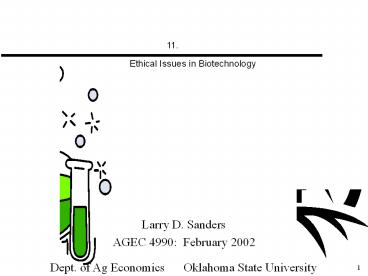Larry D. Sanders - PowerPoint PPT Presentation
1 / 17
Title:
Larry D. Sanders
Description:
Robotics, GPS, Microsensors, By-plant Prescription Production ... Federal Insecticide, Fungicide, & Rodenticide Act. Federal Food, Drug, & Cosmetic Act ... – PowerPoint PPT presentation
Number of Views:88
Avg rating:3.0/5.0
Title: Larry D. Sanders
1
11. Ethical Issues in Biotechnology
- Larry D. Sanders
- AGEC 4990 February 2002
Dept. of Ag Economics Oklahoma State
University
2
Issues OptionsBiotechnology Info Technology
- Precision or Prescription Agriculture
- the Great Green Hope?
- Robotics, GPS, Microsensors, By-plant
Prescription Production - May minimize environmental concerns
- May reduce hunger challenge
- Who can afford it?
- The next wave is for non-food uses
(nutraceuticals, pharmacologypharming)
3
Issues OptionsBiotechnology
- Bio-engineered Seed/GMOs/GEOs
- genetically altered attributes (Bt crops
bacillus thuringiensis) - Concerns
- unintended direct ecosystem impacts
- unintended mutation impacts
- unintended human impacts when eaten
- labeling to give consumer choice
- Microsofting of agricultural input marketing
4
Biotechnology Regulation
- USDA (primarily APHIS)
- Plant pests, plants, veterinary biologics
- EPA
- Microbial/plant pesticides, new uses of existing
pesticides, novel micro-organisms, new
herbicidals - FDA
- Food, feed, food additives, veterinary drugs,
human drugs medical devices
5
Federal Definition of Agricultural Biotechnology
- . . . a collection of scientific techniques,
including genetic engineering, that are used to
create, improve, or modify plants, animals, and
microorganisms.
6
Key laws
- Federal Plant Pest Act
- Federal Insecticide, Fungicide, Rodenticide Act
- Federal Food, Drug, Cosmetic Act
- Toxic Substance Control Act
- Federal Food, Drug, Cosmetic Act
7
USDA-APHIS Procedures
- Procedures to obtain permit or provide
notification prior to introducing regulated
article in US. - Regulated articles organisms/products altered or
produced thru genetic engineering that are plant
pests. - Petition process to determine non-regulated
status. - If determined non-regulated, free of APHIS review.
8
USDA-APHIS ProceduresEligibility Criteria
- Plant species corn, cotton, potato, soybean,
tobacco, tomato, or additional plant species as
determined. - Material is stably integrated.
- Material is known doesnt result in plant
disease. - Material doesnt (1) cause production of
infectious entity, (2) encode substances that may
be toxic to nontarget organisms, or (3) encode
products for pharmaceutical use. - Genetic sequences from plant viruses dont pose
significant risk of creating new plant virus. - The plant has not been modified to contain
material from animal or human pathogens.
9
USDA-APHIS ProceduresPermitting Process
- Applicant for field testing provides info about
plant - If approved, APHIS/state officials may inspect
before/during/after - Petition for commercial production seeks
non-regulated status - If approved, treated like any other plant w/o
additional APHIS action
10
Other USDA Agencies with Biotech Role
- FSIS
- FAS
- ARS
- ERS
- CSREES
- AMS
- GIPSA
11
FDA Proposal Draft Guidance (Jan 01)
- Changes voluntary consultation to mandatory
- Require food developers to
- --notify FDA at least 120 days in advance of
intent to market food or animal feed developed
thru biotech, - --to provide info to demonstrate the product is
as safe as its conventional counterpart - Proposing to increase transparency of review
process - Draft guidance provides direction to
manufacturers with voluntary labeling procedures - Comment by 28 Mar 01
- Comment by 13 Mar 01
12
Biotech Regulatory Oversight Examples
- New trait/organism Agency Reviewed for
- Viral resistance in food crop USDA Safe to grow
- EPA Safe for environment
- FDA Safe to eat
- Herbicide tolerance in food crop USDA Safe to
grow - EPA New use of companion
herbicide - FDA Safe to eat
- Modified flower color
- ornamental crop USDA Safe to grow
- Modified soil bacteria degrades
- pollutants EPA Safe for environment
13
The Ethics of Labeling/Using Biotech Food
- Labels as educational tools
- Procedural theory (informed consent)
- Utilitarian (trade-offs)
- Market-driven or government mandated labels?
- Rights theory (negative)responsibility of state
to not interfere - Utilitarianbenefits vs. costs
14
The Ethics of Labeling/Using Biotech Food
- Scientifically sound
- Scientific norms debatable but not ethically
- Labeling is an ethical issue
- Performance focused evaluation (justified in
terms of acceptability desirability of
consequences)benefits vs. costs - Structure focused evaluation (protection of
rights as precondition to ethically legitimate
use of state power)consent fairness - Conduct focused evaluation (character
virture)religion or social class may include
dietary rules honesty voluntary action may
also motivate industry or create expectations in
consumers
15
The Ethics of Labeling/Using Biotech Food
- Rights arguments may appear irrational/naïve
- May fail to understand or see as irrelevant
utilitarian arguments - May see decisions without consent as arrogant
- Utilitarians may see rights or consent as
irrelevant - Biologists/economists/producers who are
consequence-oriented may ignore citizen input - Invitation of citizens in risk assessment
regulatory hearings may permit conflict
resolution as a move to structure-focused
criteria of participation consent - Performance evaluation may see science/economics
as objective in ignoring special interests, but
may be biased against ethics of structure
conduct
16
Other Ethical Issues
- Biotech to solve hunger?
- Biotech to solve chemical overuse?
- Loss of producer independence w/contracting
w/biotech companies? - Consumer choice?
- Risk from long-term use (unintended consequences
to humans, plants, animals)? - It may be too late compensation, remediation, or
acceptance?
17
References
- Bechdol, B. Overview of Biotechnology Policy
Issues, presentation to Southern Extension
Economics Committee, Williamsburg, VA. June 2000. - Lin, W.W. Harwood, J.L. Biotechnology
Production, Marketing Policy Issue
Perspectives, presentation to Southern Extension
Economics Committee, Williamsburg, VA. June 2000. - Sandersvarious professional presentations
- Thompson, P.B., Agricultural Ethics Research,
Teaching and Public Policy, Iowa State
University, Ames, 1998.































